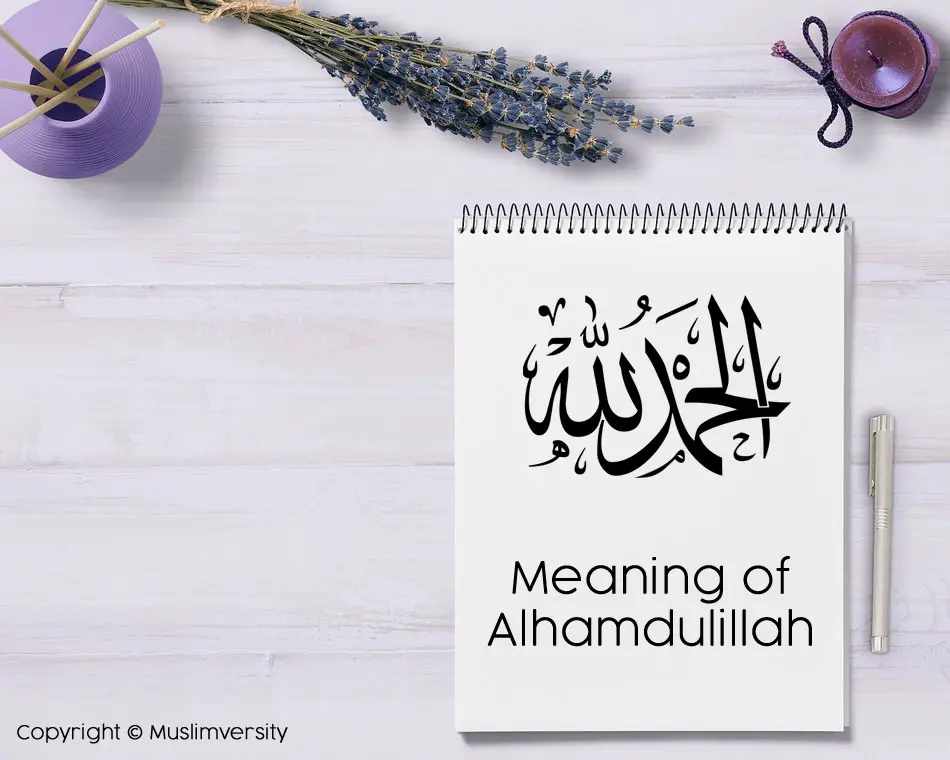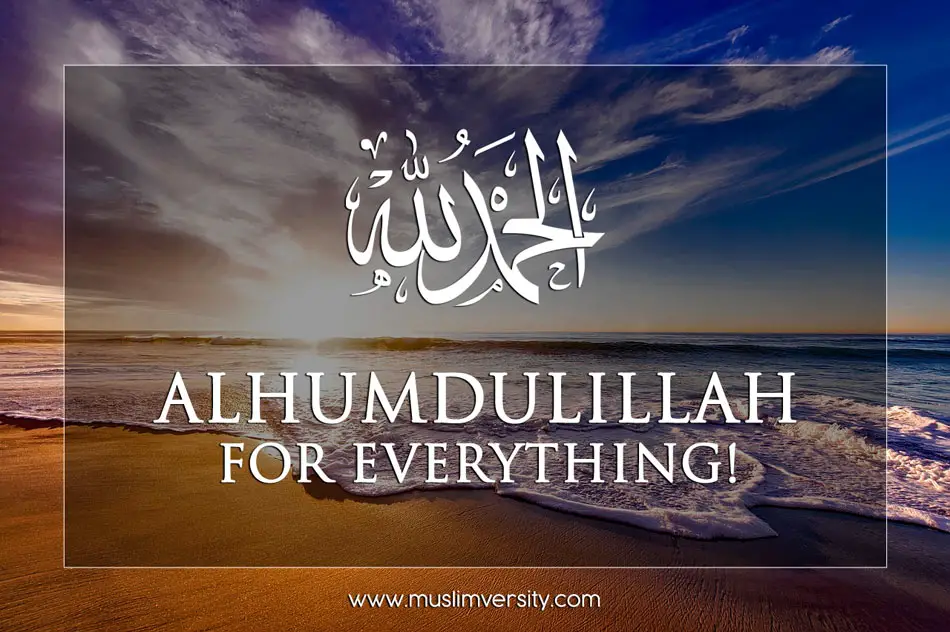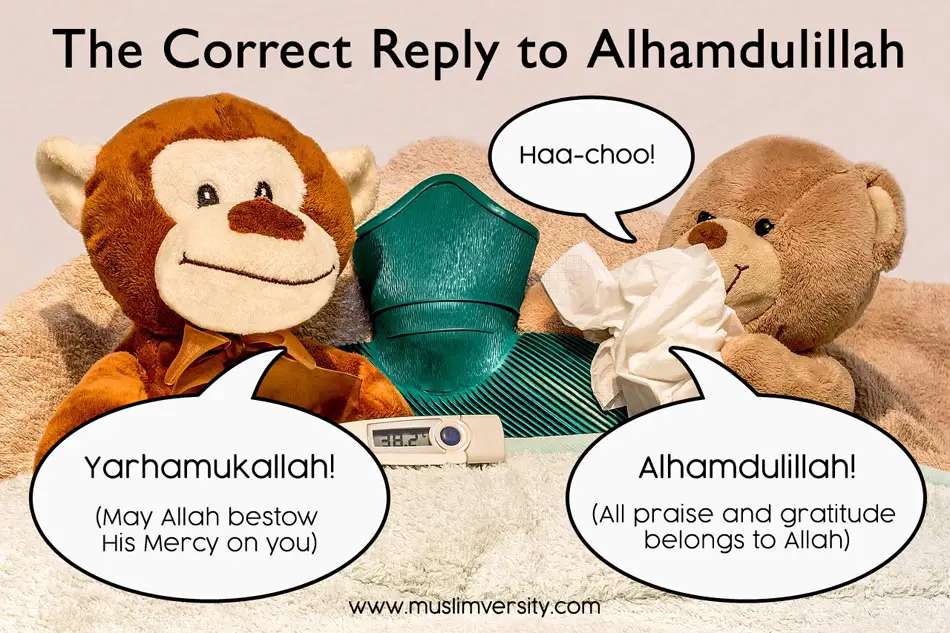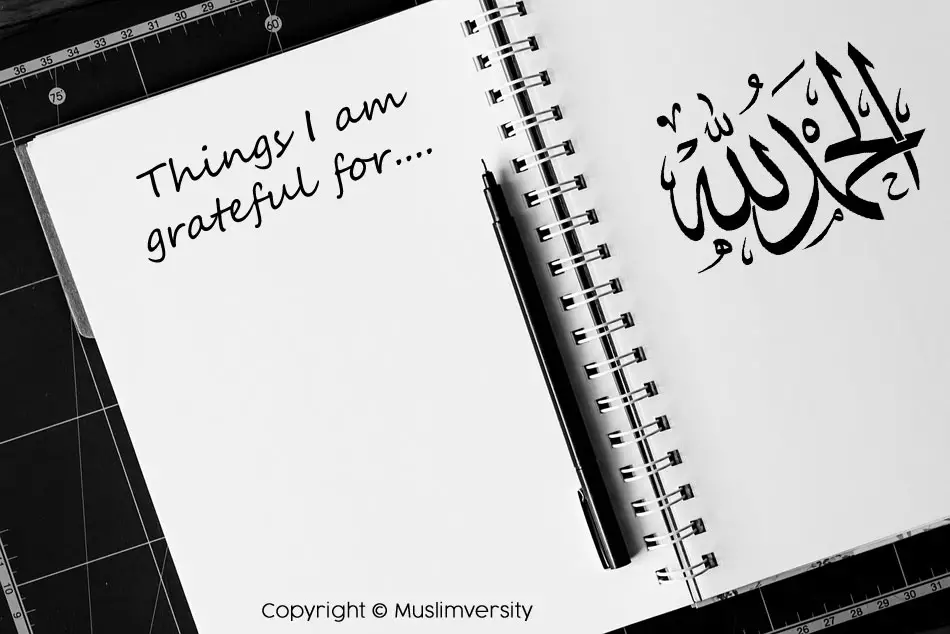
If you have Muslim friends, family or neighbors you may have heard them use the word ‘Alhamdulillah’. However, you may wonder what is the meaning of Alhamdulillah? And why do we Muslims say Alhamdulillah so frequently?
We’ll be looking at the definition of the word Alhamdulillah and its various uses in a Muslim’s day-to-day life.
What is the meaning of Alhamdulillah in English?
Alhamdulillah (pronounced “Al-Ham-Doo-Lil-Lah”) is an Arabic word. Comprehensively it means “All praise and gratitude belongs to Allah (God)”. It is a positive expression of appreciation to God for whatever happens in the life of a Muslim regardless of the situation.
The core part of the phrase that entails praise is the Arabic term “Hamd” حَمد. However, the term “Hamd” does not only mean praise. Linguistically the word Hamd is a comprehensive term that includes praise. However it also has connotations of gratitude, veneration and appreciation along with the praise.
In English I may praise someone for achieving something great. However it’s not necessary that I’m grateful to them or thanking them for that achievement when I praise them. Likewise I can be thankful to someone for helping me but it’s not necessary that I’m praising them for their assistance. The Arabic term Hamd however encompasses both praise and gratitude. And so the correct meaning of Alhamdulillah which contains the word “Hamd” becomes ‘all praise and gratitude belongs to Allah’.
Why do Muslims say Alhamdulillah?
Gratitude to Allah (God) is a way of life for Muslims. As Muslim we are perpetually optimistic by faith and always looking for ways to praise and thank Allah for all His blessings. Regardless of the situation being good or seemingly “bad”. This is because for a Muslim ultimate wisdom belongs only to Allah. And so if something seemingly “bad” happens. To a Muslim it is always good because ultimately Allah knows best. And Allah will never intend bad for His believers.
There is always a divine wisdom of the Almighty behind everything that happens. And there is a great reward for being patient through any situation. One of my most favorite characteristics of Prophet Muhammad (peace be upon him) is how he would handle both adversity and prosperity with grace and gratitude. This core belief of being eternally grateful to Allah is something that is taught to us by our Prophet Muhammad (peace be upon him).
The Messenger of Allah (peace be upon him) said, “How wonderful is the case of a believer; there is good for him in everything and this applies only to a believer. If prosperity attends him, he expresses gratitude to Allah and that is good for him; and if adversity befalls him, he endures it patiently and that is better for him”. [Sahih Muslim].

Alhamdulillah for Everything!
You may often hear a Muslim say the phrase “Alhamdulillah for everything”. Or in Arabic “alhamdulillah ala kulli haal”. Which means “All praise and gratitude belongs to Allah in every situation”. This is an expression of complete trust and gratitude to Allah which is taught to us by our Prophet Muhammad (peace be upon him):
When the Messenger of Allah (peace be upon him) saw something he liked, he would say: ‘Alhamdulillāh alladhi bi ni’matihi tatim us-sālihāt (All praise and gratitude belong only to Allah by Whose blessing and favors good things are accomplished).’
And if he saw something he disliked he would say: ‘Alhamdulillāh ‘ala kulli hāl (All praise and thanks belong only to Allāh in all circumstances).’” – [Saheeh al-Jāmi’ 4727]
No matter what we are going through in life. There is always something to be grateful for and praise Allah by saying Alhamdulillah. The Prophet (peace be upon him) was always so humbly grateful to Allah. He taught us that simply waking up healthy, feeling safe and having food for the day was equivalent to acquiring the whole world. Now that’s true gratitude! Something most of us do every day without even realizing what a great blessing it truly is.
The Messenger of Allah (peace be upon him) said: ‘Whoever among you wakes up physically healthy, feeling safe and secure within himself, with food for the day, it is as if he acquired the whole world.”
Source: https://sunnah.com/urn/1292430
Allah constantly reminds us in the Qur’an to reflect and ponder over His blessings and creation. We Muslims are naturally meant to be a people of reflection and appreciation. Think about the last time you praised and thanked Allah for your health, safety and food for the day.
Prophet Muhammad (peace be upon him) truly understood how reliant we are upon Allah. So much so that he would supplicate and pray to Allah to not leave him to his affairs even for a blink of an eye!
“O Allah, Your mercy I am hopeful for, so do not leave me to myself for the blink of an eye, and put all my affairs in order, there is no god but You” – [Sunan Abu Dawud]

Pronunciation of Alhamdulillah
Alhamdulillah is pronounced Al-ḥamdu lil-lāh (Arabic: ٱلْـحَـمْـدُ للهِ). Phonetically you’d write it like this – “Al-Ham-Doo-Lil-Lah”.
How do you use Alhamdulillah?
Alhamdulillah is a phrase used by Muslims to thank Allah for all his blessings. Whether something good or bad happens a Muslim is always optimistic. And thanks Allah by saying Alhamdulillah (all praise and gratitude belongs to Allah). It is also a phrase used by Muslims after they sneeze.
Why we say Alhamdulillah after sneezing?
Muslims say “Alhamdulillah” after sneezing because this is something that is instructed by our Prophet Muhammad (peace be upon him). In various hadith (sayings of Prophet Muhammad) it is narrated that when one sneezes they should say Alhamdulillah.
The Prophet (peace be upon him) said, “If anyone of you sneezes, he should say ‘Al-Hamduli l-lah’ (All praise and gratitude belongs to Allah) – [Sahih al-Bukhari]
Sneezing also has certain health benefits. It is an essential part of our immune system. Sneezing removes harmful bacteria and viruses through our noses. So in essence, even before science discovered that sneezing has certain health benefits. God Almighty (Allah) in His divine timeless wisdom instructs mankind to be grateful for instilling this natural process that removes harmful bacteria and viruses from our bodies.
Reply to Alhamdulillah – What do you say after Alhamdulillah?
When a Muslim sneezes he/she will say Alhamdulillah. The response of another Muslim after he/she hears this Alhamdulillah is to reply ‘Yar-hamuka-l-lah’. The meaning of Yarhamukallah is ‘may Allah bestow His Mercy upon you’. It is the Muslim’s equivalent of the common English phrase “bless you” when someone sneezes. Then, after hearing Yarhamukallah, the one who originally sneezed will respond ‘Yahdikumul-lah wa Yuslih balakum’. Which means ‘may Allah give you guidance and improve your condition’.
The above is an instruction of the Prophet Muhammad as mentioned in this hadith of the Prophet:
The Prophet (peace be upon him) said, “If anyone of you sneezes, he should say ‘Al-Hamduli l-lah’ (All praise and gratitude belongs to Allah), and his (Muslim) brother or companion should say to him, ‘Yar-hamuka-l-lah’ (May Allah bestow His Mercy on you). When the latter says ‘Yar-hamuka-llah”, the former should say, ‘Yahdikumul-lah wa Yuslih balakum’ (May Allah give you guidance and improve your condition). – [Sahih al-Bukhari]
Gratitude brings about positivity and blessings. Our Prophet taught us to encourage praise and gratitude to Allah for all His blessings. Therefore as a community we are instructed to pray for God’s Mercy by saying Yarhamukallah (may Allah bestow His Mercy upon you). When someone acknowledges God’s favors upon them by saying “Alhamdulillah” when he/she sneezes. And as a response of this kind prayer of Mercy we respond in likeness by saying ‘Yahdikumul-lah wa Yuslih balakum’. Which is a prayer for guidance and prosperity. This is how as a community we create positivity and gratitude to Allah with prayers of mercy and guidance for each other.

Why does Allah need me to praise and worship Him?
This is a common question by many people. Why does Allah need me to praise Him and show gratitude to Him? Almighty Allah answers this question Himself in the Qur’an multiple times.
“O mankind, worship your Lord, who created you and those before you, that you may become righteous” – [Qur’an 2:21]
Source: https://quran.com/2/21
“And We had certainly given Luqman wisdom (and said), “Be grateful to Allah”. And whoever is grateful is grateful for (the benefit of) himself. And whoever denies (Allah’s favors) – then indeed, Allah is Free of need and Praiseworthy. – [Quran 31:12]
Source: https://quran.com/31/12
In other words, Allah is free from the need of praise and gratitude. Allah is praiseworthy and worthy of gratitude regardless if His creation shows gratitude to Him or not. We praise and show gratitude to Allah to benefit ourselves and become righteous. Being grateful brings about many spiritual and character benefits. A grateful person is a happy person who spreads happiness to others. A grateful person is content with what he/she has and has a positive outlook in life. The one who has the characteristics of thankfulness and gratitude with the Creator and the creation. Is loved by the Creator and the creation.
The Benefits of saying Alhamdulillah
Alhamdulillah is a spiritual gift from Allah that we Muslims use to bring goodness to our lives and the lives of others around us. In fact one of the ways to increase the blessings we have in our lives is to continuously praise and thank God. And this is something our Creator reminds us in the Qur’an.
“’If you are grateful, I will surely increase you (in favor);” – [Quran 14:7]
Source: https://quran.com/14/7
In other words, if you love the favors that the Almighty has bestowed upon you. And want to keep them or increase them. Then show gratitude to Allah by saying Alhamdulillah. And Allah promises to increase His favors upon us when we show gratitude to Him.
![Islamic Quotes from Quran - If you are grateful, I will surely increase you. - [Quran 14:7]](https://muslimversity.com/wp-content/uploads/2019/10/islamic-quotes-quran-quotes-alhamdulillah-gratitude_muslimversity-683x1024.jpg)
There have been various books written by motivational speakers on the ‘law of attraction’. And how the positive and negative thoughts that we internalize attract negativity and positivity in our lives. Even these successful personalities came to the realization that being grateful and positive brings about more positivity. And the impact on the mind and a person’s life when a person is grateful. A quote attributed to the American author Zig Zaglar sums it up well.
“Gratitude is the healthiest of all human emotions. The more you express gratitude for what you have, the more likely you will have even more to express gratitude for.” – [Zig Ziglar]
He also stated a very profound fact of the human psyche:
“When you focus on problems, you get more problems. When you focus on possibilities, you have more opportunities.” – [Zig Zaglar]
As Muslims we should not cloud our minds with things that are seemingly going wrong in life. Whatever we focus on grows. And negativity only attracts more negativity and we fail to appreciate the good things in life. The one who is not grateful with the little things will never truly be grateful for the big things. We should always learn to be grateful. And this will increase us in our positivity and blessings.
The great Islamic scholar Imam Al-Ghazali said something really profound.
“The two essential qualities of a Muslim’s character are patience and gratitude. And all that patience is, is gratitude at the times of hardship. And gratitude is patience at the time of ease.” – [Imam Al-Ghazali]
In other words when you are going through tough times and hardship. Be patient and show gratitude for what you do have by saying Alhamdulillah. And we all have something to be grateful for regardless of our situation. And if you are at ease then show gratitude for what you do have by again saying Alhamdulillah. For nothing lasts forever and perhaps it is the gratitude that you show at times of ease that may help you at your time of hardship.
The Messenger of Allah (peace be upon him) said, “Whoever would be pleased for Allah to answer him during times of hardship and difficulty. Let him supplicate often during times of ease.” – [Sunan al-Tirmidhī 3382]
— Muslimversity (@muslimversity) October 1, 2019
The graphic above shows the undisputed UFC lightweight champion Khabib Nurmagomedov showing gratitude to Allah by saying Alhamdulillah.
How many times do you say Alhamdulillah?
Muslims say Alhamdulillah multiple times in the day to praise and thank God. A Muslim should be in perpetual praise, thankfulness and gratitude to Allah. And therefore there is no restriction on how many times a person should say Alhamdulillah. The more someone understands that everything that he/she is blessed with is from Allah. The more one internalizes the meaning of Alhamdulillah and is ever grateful.
However, there are certain narrations of Prophet Muhammad where he specifies how many times we should say Alhamdulillah as part of our daily routine. We should say Alhamdulillah thirty-three times in our daily dhikr (daily remembrance of Allah). This is generally done after offering each of the five obligatory prayers and before going to bed. If you would like to know more about the Muslim prayers I have written a detailed discussion on the topic of how many times a day do Muslims pray. I also discuss why Muslims pray 5 times a day and what are the timings of the five daily prayers.
The Messenger of Allah (peace be upon him) said, “Shall I not teach you something with which you may overtake those who surpassed you and with which you will surpass those who will come after you? None will excel you unless he who does which you do.” They replied: “Yes, please do, O Messenger of Allah” He said, “You should recite: SubhanAllah (Allah is free from imperfection), AllahuAkbar (Allah is Greater than everything), Alhamdulillah (All praise and gratitude belongs to Allah) thirty-three times after each prayer.” – [Sahih al-Bukhari and Sahih Muslim].
“Recite Subhaana Allah thirty-three times, Alhamdulilllah thirty-three times and AllahuAkbar thirty-four times as you go to bed.” – [Sahih Muslim]
Source: https://sunnah.com/muslim/48/111
5 Powerful verses from the Qur’an that remind us to be Grateful and say Alhamdulillah
1. The first word in the holy Qur’an begins with the word Alhamdulillah
Alhumdulillah is the phrase with which the Qur’an beings with. The verse reads Al-hamdu l-illahi rabbi l-ʿalamin (Arabic: الحمد لله ربّ العالمين). Which means ‘all praise and gratitude belongs to Allah, the Lord of the worlds’.
I personally know many converts to Islam who have confessed that Islam entered their hearts after reading the very first verse of the Holy Qur’an. They knew instantly that this book is a Divine book from God. A book that is unlike any book written by man. It begins with praising and showing gratitude to God with the words ‘Alhamdulillah’.
Alhamdulillah is also one of the first words a Muslim child learns to say in infancy. So whether a Muslim is born in the faith or converts to Islam at a later date. The journey of every Muslim to Islam begins with the humble phrase of devotion and gratitude ‘Alhamdulillah’.
All praise and gratitude is (due) to Allah, Lord of the worlds – [Qur’an 1:2]
Source: https://quran.com/1/2
2. The Prophet and King Sulaiman (Solomon) was ever grateful and humble to His Lord
Most of the Prophets of Allah that we know about lived very poor and humble lives. Sulaiman (peace be upon him) also known as King Solomon in the Judaeo-Christian sources. Was one of the few Prophets that was also a king with a vast kingdom that transcended beyond our human realm. Yet, his vast kingdom and power did not make Sulaiman arrogant or prideful. Rather he realized the true meaning of Alhamdulillah and that everything he has is a blessing from Allah. So he humbled himself and asked Allah to make him grateful for the favors He had bestowed upon him.
“My Lord, enable me to be grateful for Your favor which You have bestowed upon me and upon my parents and to do righteousness of which You approve. And admit me by Your mercy into [the ranks of] Your righteous servants.” – [Qur’an 27:19]
Source: https://quran.com/27/19
This is an amazing du’a (supplication) of praise and gratitude by a humble Prophet of Allah which we should all incorporate into our lives.
3. Allah rewards those who are grateful to Him and increases their blessings
When Allah the Owner of all the treasures of this world and the Hereafter. The Owner of everything, says “I will reward those who are grateful”. And “’If you are grateful, I will surely increase you”. Then know that this is not something small or insignificant. The rewards of Allah are limitless and bountiful. So if you want a piece of His infinite bounty. Then embrace the characteristic of gratitude in your life and say Alhumadulillah for everything. Not only will Allah reward you for your gratitude he will also increase your blessings.
“And whoever desires the reward of this world – We will give him thereof; and whoever desires the reward of the Hereafter – We will give him thereof. And we will reward the grateful.” – [Qur’an 3:145]
Source: https://quran.com/3/145
“’If you are grateful, I will surely increase you (in favor);” – [Quran 14:7]
Source: https://quran.com/14/7
4. Allah will not punish those who are grateful and believe in Him
As human beings we are prone to error and sin. Allah will not gain anything by punishing us for our sins. It is only we who are at loss by not being grateful to the One that has given us everything. Along with repenting from our sins. We should also embrace the quality of gratitude to the One who is most Appreciative and All-Knowing – Allah.
“What would Allah gain by punishing you if you are grateful and believe? And ever is Allah Appreciative and All-Knowing.” – [Qur’an 4:147]
Source: https://quran.com/4/147
5. Shaytan’s ultimate goal is to make us ungrateful
We all know the story of Shaytan also known as Iblis or Satan/Lucifer in the Judaeo- Christian sources. When he challenged Allah to lead mankind astray. However, how many of us know what his exact challenge to Allah was? Allah tells us in the Qur’an that the challenge of Shaytan was that he would come to us from every corner and make us ungrateful.
“Then I will come to them from before them and from behind them and on their right and on their left, and You will not find most of them grateful (to You).” – [Quran 7:17]
Source: https://quran.com/7/17
When we embrace the quality of saying Alhamdulillah for everything. We not only bring rewards and blessings in our lives. We also become of those who have made Shaytan lose his challenge and be humiliated. And we become of those who Allah loves.
5 Powerful statements of Prophet Muhammad on Thankfulness and saying Alhamdulillah
1. Alhamdulillah fills your scales of good deeds on the Day of Judgment
The goal of every Muslim is to stand in front of his/her Lord on the Day of Judgment having their scales of good deeds filled with the good actions they did in this life. Alhamdulillah is one phrase that is so powerful that it fills the scales of good deeds on the Day of Judgment.
The Messenger of Allah (peace be upon him) said: “Cleanliness is half of faith and al-Hamdu Liliah (Praise be to Allah) fills the scale”. – [Sahih Muslim]
Source: https://sunnah.com/muslim/2/1
2. Those who do not thank the people do not thank Allah
A fundamental teaching of Islam is to be humble and thankful to the people. Showing gratitude and being thankful to those that show us kindness is a sign of good manners and humility. The true meaning of Alhamdulillah is only complete when we are grateful to the creation of Allah.
A fundamental teaching of Islam is to be humble and thankful to the people. Showing gratitude and being thankful to those that show us kindness is a sign of good manners and humility. The true meaning of Alhamdulillah is only complete when we are grateful to the creation of Allah.
However, when thanking someone else other than Allah we do not say ‘Alhamdulillah’ as this is only reserved for Allah. When thanking another individual the correct term to use would be Jazāk Allāhu Khayran (جزاك اللهُ خيرًا). Which in English would translate to “May God reward you with goodness.”
No doubt having such good manners of being grateful to people will increase the good deeds of a person. However, in Islam we are rewarded twice for thanking the people as we are also thanking Allah. This concept of thanking the people is equivalent to thanking Allah is taught to us by our beloved Prophet Muhammad (peace be upon him):
The Prophet (peace be upon him) said: He who does not thank the people is not thankful to Allah.- [Sunan Abu Dawud]
Ultimately all good comes from Allah so when we thank someone we are actually thanking Allah. One of the great scholars of the past said something really profound. He said, ‘when you say Alhamdulillah then you owe another Alhamdulillah to Allah for the ability to say the first Alhamdulillah. Since it was Allah who bestowed Iman (faith) in your heart and gave you the faculty of speech. Without which you could never have said Alhamdulillah in the first place’.
Truly mind blowing! I had goosebumps the first time I heard this from my teachers. I remember saying to myself, ‘Now here is a man who understands the meaning of Alhamdulillah and what it means to truly be grateful to Allah Almighty’.
3. Alhamdulillah is the best of supplication
Alhamdulillah is something which our Prophet said is the ‘best’ supplication. Naturally so, since Alhamdulillah is such a beautiful phrase. Filled with humility, veneration, praise and gratitude for the One who has bestowed countless blessings upon us.
The Messenger of Allah (peace be upon him) said: “The best of remembrance is La ilaha illallah (None has the right to be worshipped except Allah), and the best of supplication is Al-Hamdu Lillah (all praise and gratitude is to Allah).”
4. Allah loves and is pleased with those who say Alhamdulillah
When we are grateful and acknowledge Allah’s favors and blessings upon us. Allah is pleased with us and loves us. Imagine a simple statement of glorification and gratitude can gain you the love of Allah.
“Allah’s Messenger (peace be upon him) said: Allah is pleased with His servant who says: Alhamdulillah while taking a morsel of food and while drinking.” – [Sahih Muslim]
Source: https://sunnah.com/muslim/48/123
The Messenger of Allah (peace be upon him) said, “Shall I tell you the expression that is most loved by Allah?” It is ‘Subhan-Allahi wa bihamdihi’ (Allah is free from imperfection and to Him is all praise and gratitude)’.” – [Sahih Muslim]
5. Any matter not begun with Alhamdulillah remains defective
Ungratefulness makes our behavior selfish and deprives us of blessings. On the other hand, praise and gratitude to Allah makes us humble and brings about blessings in all that we do. Without showing praise and gratitude to Allah before starting any matter of importance. That matter remains defective and is deprived of blessings.
So always remember to praise and thank Allah by saying Alhamdulillah before starting any good work. And the action will be blessed and not remain defective and deprived of goodness, in sha Allah (God willing).
The Messenger of Allah (peace be upon him) said, “Any matter of importance which is not begun with Al-hamdu lillah (all praise and gratitude be to Allah) remains defective.” – [Sunan Abu Dawud]
What are you grateful and thankful for?
You have now learned the meaning of Alhamdulillah and it’s different uses and benefits. Alhamdulillah is a central part of a Muslim’s daily life of showing gratitude to the Almighty and His creation. Think about the things that you are grateful for and if you’ve benefited from this article then please share it with others. You never know who you might benefit by sharing this post and bringing the gift of gratitude in their life.
